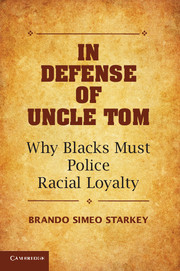Book contents
- Frontmatter
- Dedication
- Contents
- Acknowledgments
- Introduction
- 1 Solidarity, Social Norms, and Uncle Tom
- 2 Uncle Tom: 1865–1959
- 3 The Unwitting Pioneers
- 4 Uncle Tom: 1960–1975
- 5 No Man Was Safe
- 6 Uncle Tom Today: 1976–Present
- 7 So What About Clarence?
- 8 The Curious Case of Uncle Tom
- 9 What Now, Uncle Tom?
- Final Address
- Index
- References
2 - Uncle Tom: 1865–1959
Published online by Cambridge University Press: 05 May 2015
- Frontmatter
- Dedication
- Contents
- Acknowledgments
- Introduction
- 1 Solidarity, Social Norms, and Uncle Tom
- 2 Uncle Tom: 1865–1959
- 3 The Unwitting Pioneers
- 4 Uncle Tom: 1960–1975
- 5 No Man Was Safe
- 6 Uncle Tom Today: 1976–Present
- 7 So What About Clarence?
- 8 The Curious Case of Uncle Tom
- 9 What Now, Uncle Tom?
- Final Address
- Index
- References
Summary
The Origins of Uncle Tom
To misuse Uncle Tom is to ball up one’s fist and drill it right into the epithet’s gut. Each punishing body blow saps its power. Uncle Tom has taken innumerable haymakers and is now wobbly. As if its eyes are swollen shut, the epithet cannot see the race’s true foes and just swings aimlessly. Anyone can be hit with Uncle Tom accusations. Uncle Tom is a destructive force within black America.
In 2013, for instance, at the National Association of Black Journalists Convention, Hugh Douglas, a former National Football League player, heaved Uncle Tom at Michael Smith, his cohost of their ESPN television show, Numbers Never Lie (NNL). Douglas was apparently uneasy about the future of NNL after Smith’s good friend, Jemele Hill, joined the show. Smith and Hill, both former print journalists, left Douglas apparently insecure as the outnumbered ex-athlete. At a convention-sponsored party at a local club, an inebriated Douglas was headed to the stage, and Smith directed Douglas to not go up to it. Douglas obliged. But after a few minutes, Douglas berated Smith and called him an Uncle Tom. As is now common, Douglas reached for the painful slur to settle a personal dispute that had no impact on racial loyalty. That Douglas was intoxicated is fitting because Uncle Tom is a punch drunk epithet that blacks should retire, many feel. Uncle Tom’s origins, however, were far more auspicious than its president-day status indicates. Black folk must rekindle that lost promise. It is mandatory.
- Type
- Chapter
- Information
- In Defense of Uncle TomWhy Blacks Must Police Racial Loyalty, pp. 42 - 105Publisher: Cambridge University PressPrint publication year: 2015



